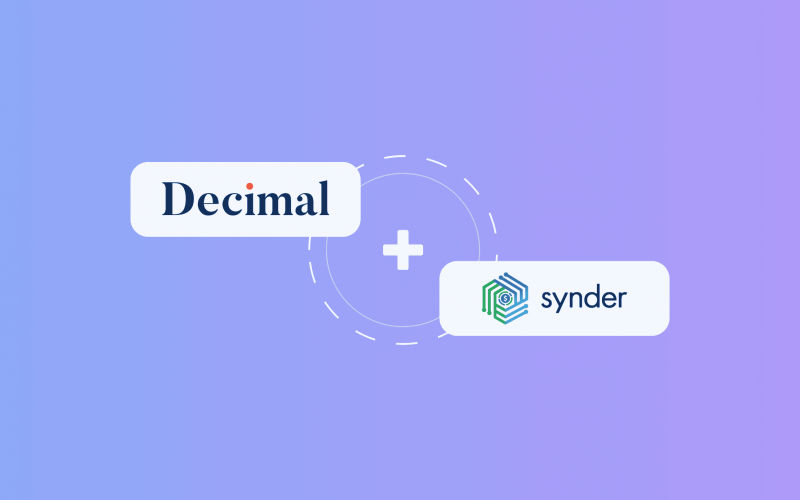The month-end close: a necessary evil that keeps accounting teams up at night. Why? Manual reconciliation with high transaction volumes and multiple payment platforms can leave your team feeling burned out and frustrated.
But there’s hope—leading firms like Decimal have found a way to reduce reconciliation time by 50% and save over 140 hours each month without sacrificing accuracy.
Decimal is an innovative accounting firm dedicated to modernizing bookkeeping and tax solutions for small to medium-sized businesses. Their team combines accounting expertise with cutting-edge technology to deliver seamless, accurate, and scalable financial management. Decimal focuses on simplifying operations for businesses in industries like ecommerce, SaaS, and professional services.
If your firm wants to achieve the same level of efficiency and scalability, follow these five key steps to streamline your month-end close process, just like Decimal.
Step 1: Automate multi-platform transaction management
The problem
Large accounting firms handle thousands of transactions across multiple payment systems, including Stripe, PayPal, Shopify, Amazon, and QuickBooks Online. Manual reconciliation can quickly turn into a nightmare of spreadsheets, late nights, and constant dread of human error. One misplaced decimal (literally—no pun intended) or missed entry, and your financials are a mess.
Sounds familiar?
For large accounting firms, this isn’t just a headache—it’s a productivity black hole.
What Decimal did
Decimal implemented Synder, the ultimate financial automation tool that seamlessly integrates with over 30 major sales, payment and accounting platforms, establishing one source of truth for all financial data. This eliminated the need for manual data entry and cut month-end close time by over 50%, allowing Decimal’s team to shift their focus to more important, strategic tasks.
Synder helps accounting firms cut costs and handle more clients with the same resources while ensuring accurate, real-time financial data. With Synder’s automated financial processes and simplified month-end closing, Decimal can proactively address their clients’ financial bottlenecks, reduce errors, and eliminate the need for manual corrections.
“Since integrating Synder, Decimal has streamlined workflows, reduced reconciliation time by over 50%, and saved 6-8 hours per client each month, enabling the team to focus on strategic advisory services and client growth.”
Kristin Miller, Team Lead at Decimal
How your firm can apply this
- Identify the platforms your clients use (Stripe, PayPal, Amazon, etc.).
- Implement Synder to sync and reconcile transactions automatically.
- Focus on strategic advisory services instead of repetitive data entry.
Step 2: Implement real-time financial reporting
The problem
Without real-time financial visibility, you’re forced to constantly play catch-up—manually sorting through piles of transactions, categorizing line by line, and stitching together reports that are already outdated by the time they’re done. This leaves you with missed opportunities, stalled growth, and frustrated clients left in the dark. It’s like trying to navigate a fast-moving highway with a map from last week. This delay becomes a roadblock to delivering the value your clients deserve.
What Decimal did
With Synder’s advanced reporting tools, Decimal could automatically categorize transactions and generate real-time financial reports for its clients. This enabled better strategic planning and budgeting.
“Synder’s intuitive reporting tools have enhanced Decimal’s ability to deliver actionable insights, while its exceptional support team has ensured a smooth user experience. Synder has provided more granular insights into cash flow and revenue trends, allowing us to deliver advisory services with actionable recommendations.” — Kristin Miller, Team Lead at Decimal
How your firm can apply this
- Automate financial categorization and reporting with Synder to ensure real-time data.
- Use visual dashboards and analytics to track cash flow, revenue trends, and profitability.
- Provide clients with accurate, timely insights to help them make informed business decisions.
Step 3: Customize automatic categorization to your clients’ needs
The problem
Clients with high transaction volumes and complex reporting requirements often face a mountain of uncategorized data. Manual categorization is slow, error-prone, and simply not enough to keep up with the unique nuances of each business. This leads to delayed insights, frustrated clients, and inefficiencies that hinder growth.
What Decimal did
Decimal reshaped its transaction categorization by implementing Synder’s Smart Rules, a dynamic automation tool that instantly sorts and categorizes transactions based on custom rules. Instead of using generic categorizations, Decimal customized the rules based on each client’s specific financial needs, taking into account their revenue streams, expense types, tax classifications, and payment sources.
This opened up a world of new opportunities. For example, domestic sales could now be automatically assigned the correct state-specific sales tax rate, while international transactions could be flagged as tax-exempt exports, ensuring compliance without manual intervention.
What’s more, with Smart Rules, Synder automatically assigns categories and applies conditions to transactions as soon as they sync, eliminating the need for manual sorting and review. For Decimal’s clients with high transaction volumes, this was a real revolution—saving hours of work and preventing costly misclassifications.
“Synder’s automatic categorization feature has been invaluable for clients managing high transaction volumes and complex reporting needs.” — Kristin Miller, Team Lead at Decimal
How your firm can apply this
- Analyze your clients’ industries, transaction types, and reporting requirements to determine the best categorization rules.
- Use Synder to set up custom rules that automatically categorize transactions based on client-specific criteria.
- Monitor and tweak the categorization rules to ensure accuracy and adapt to any changes in your clients’ businesses.
Step 4: Optimize multicurrency and global transactions
The problem
Large accounting firms serving international clients often struggle with multicurrency transactions and exchange rate discrepancies. Without automation, firms spend hours manually adjusting foreign transactions.
What Decimal did
By leveraging Synder’s multicurrency support, Decimal ensured accurate exchange rate calculations and seamless international transaction management. Instead of manually adjusting each transaction, Synder automatically converted foreign transactions into the client’s home currency, ensuring accurate profit and loss tracking across global operations.
Whether transactions came from Stripe, PayPal, Shopify, or Amazon, Synder unified all foreign currency payments and synced them accurately with QuickBooks Online and Xero, eliminating discrepancies between platforms.
“Synder’s multicurrency support, seamless integrations with platforms like Stripe, PayPal, Shopify, and Amazon, and its automatic categorization feature have been invaluable for clients managing high transaction volumes and complex reporting needs.” — Kristin Miller, Team Lead at Decimal
How your firm can apply this
- Automate multicurrency reconciliation with Synder to ensure precise exchange rate calculations.
- Use automatic categorization to simplify international accounting.
- Offer global financial insights to help clients expand internationally.
Step 5: Scale operations without increasing overhead costs
The problem
As accounting firms grow, managing more clients without adding more staff or increasing overhead becomes a challenge. Without automation, scaling means longer work hours, more errors, and reduced efficiency.
What Decimal did
Decimal recognized that manual processes were unsustainable for growth, so they implemented Synder’s automation features to streamline operations. This allowed Decimal to serve more clients without increasing costs, all while maintaining high service quality and accuracy.
“Synder has significantly improved team efficiency, collaboration, and scalability, allowing Decimal to serve more clients effectively and provide high-quality financial services.” — Kristin Miller, Team Lead at Decimal
How your firm can apply this
- Use Synder’s automation to handle more clients without hiring more staff.
- Standardize processes to reduce workload per client.
- Improve collaboration between departments with centralized financial data.
Final takeaways: How to become a more efficient accounting firm
By following these five steps, your accounting firm can leverage Synder to cut month-end close time by 50%, just like Decimal did:
Step 1: Automate multi-platform transaction management;
Step 2: Implement real-time financial reporting ;
Step 3: Customize automatic categorization to your clients’ needs;
Step 4: Optimize accounting for multicurrency and global transactions;
Step 5: Scale operations without increasing overhead costs;
Are you ready to transform your accounting processes?
By implementing Synder’s automation, Decimal significantly improved efficiency, cut reconciliation time in half, and scaled its operations without increasing costs. If your firm wants to achieve the same results, try Synder’s 15-day free trial or join our Weekly Public Demo to see how real-time data sync and customized automation can revolutionize your accounting processes.






